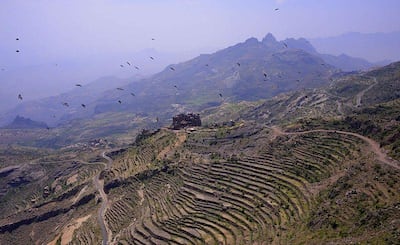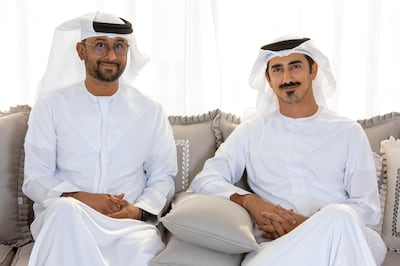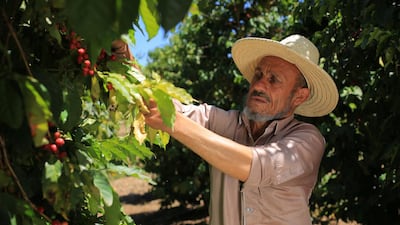A good cup of coffee underlines the start to most days for most people, whether it comes in a cafetiere, aluminium pod, is ground at home and brewed in a Chemex, or handed to you in a takeaway cup at a local coffee shop. But just how good is that coffee?
We are not necessarily talking about the quality of the roast, rather, the bean to barista journey, which started long before you hit the "on" button of your machine. While the label Fair Trade is nothing new, it doesn’t always take into account other ethical concerns, such as the carbon footprint of the beans, nor guarantee that they are organic.
This is where People’s Coffee comes in. A company launched by Sheikh Dr Majid Al Qassimi, who has a doctorate in veterinary medicine, and Emirati entrepreneur Ali Mansoor Al Ali, it brings Yemeni coffee to the UAE. As the name implies, the company’s focus is on the people producing the coffee - the Yemeni farmers, some of whom have had coffee farms in their families for generations.
"People's Coffee focuses on individuality and avoids dime-a-dozen labour, shifting from [business] relationships towards a human-to-human approach," Al Qassimi tells The National. "The People's Coffee operations team works closely with farmers ... we distribute value across all parts of the supply chain, aiming for sustainable relationships between people and coffee."
Al Ali adds: “Apart from wanting to highlight the stories [of the farmers], seeing how unfairly the revenue was being distributed encouraged me to try and work on a model that would give them what they deserved for all the hard work. I was on a quest to improve their quality of life, and Sheikh Dr Majid was the best figure to help me do that, with his voice, authority and humbleness."
Launching a company at the best of times is challenging enough, but Al Qassimi and Al Ali came together this year to start for People’s Coffee, confident that the UAE has a sizeable market for ethical and regionally sourced products. In fact, Al Qassimi argues that, if anything, launching in 2020 has benefited the company, as many consumers have had significant shifts in ethical perspective.
“There’s never been a better time to start a business," he exclaims. "Launching a company, and having it grow and thrive during a pandemic is not only rewarding, but also a sure-fire way to ensure its strength and potential for continuity and success down the line. Moreover, Covid-19 has made consumers rethink their purchasing decisions. With the prevalence of more human stories from across the globe, there has been an increasing interest in knowing what goes into the making of the products we buy – often on a daily basis.”
He adds: “People can turn their everyday purchases into a profound force for good; hence, every dirham is a vote for the world we want to live in.”
Al Ali echoes these sentiments, and says customers are now more switched on than ever to the moral background of their coffee. “We now have an aware, educated consumer who would like to know more about what went into the making of the cup they are drinking, rather than simply having it in a hurry and moving on, or just grabbing that perfect photo for Instagram,” he says. “There’s demand for rich, good coffee and just that. Coffee drinkers can now identify the differences in taste, and are even making their own at home with sophisticated machines: how can you offer anything but the best to such a discerning consumer?
"Yemeni coffee is a real treasure – I have seen this throughout my travels. The Haraz region bean is a gem, this isn’t merely speculation – it’s a fact. There’s no competition out there that this coffee hasn’t won, if it’s there, it’s winning.”

What makes Yemeni coffee stand out?
Sheikh Dr Majid Al Qassimi explains why we should be drinking coffee from Yemen:
"Coffee from Yemen has an important historical significance; the farmers who inherited the trade from their parents and grandparents for hundreds of years have their coffee farms in Haraz, sitting at altitudes of 1,800 metres to 2,450m above sea level. This coffee is full-bodied and rich with a strong, exotic fragrance. The flavour profile includes notes of fruit and chocolate, as well as a distinct raisin taste. A bright acidity adds some fruity bite to the cup. Again, this is more of a luxury coffee than an everyday bean.
“Yemeni farmers preserve a coffee industry that dates back to ancient times, to turn beans from the mountains of Yemen into coffee served in the best venues around the globe.
“Dried cherries are handpicked, collected direct from farmers, in red, pink and yellow grains, ensuring that People’s Coffee is 100 per cent authentic. Neutrally (unwashed), the cherries are laid on wire mesh beds with a layer of palm leaf mats for exposure to natural sunlight, until they reach a desirable moisture level. Modern hull equipment and careful cleaning offer grains of uniform size, free from defects and impurities, ensuring a consistent roast that results in a rich and healthy flavour.
“Packaging is in ecological plastic bags, which are extremely strong and have high oxygen and moisture barrier properties to seal the freshness of green coffee throughout the supply chain and storage, covered with an outer burlap jute bag. We keep an excellent packaging method, offering superior aroma retention and a smell barrier that is very suitable for green coffee beans.
“Each farm maintains a distinct taste and flavour, and this gives a wide variety of options, making it a world worth discovering and enjoying.”




